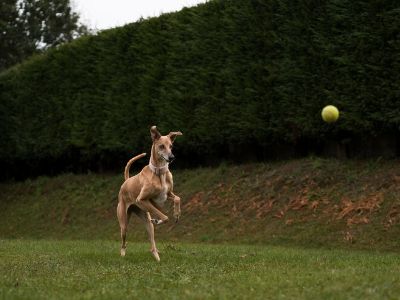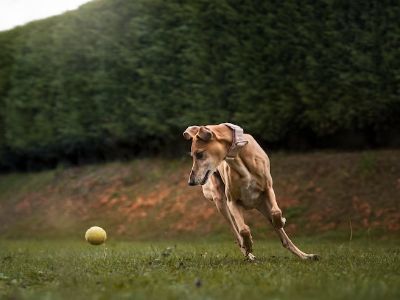Tennis balls are quite popular amongst the dog community. The majority of dog owners prefer using a tennis ball for playing fetch with their furry friends. They are easily available and widely accepted by different dog lovers for playing with their dogs.
But, there have been many instances where a dog has suffered because of playing with the tennis balls. So, are tennis balls bad for dogs? This article will provide you with some interesting details and help you recognise whether tennis balls are safe for dogs or not.
Are Tennis Balls Bad For Dogs?
It’s hard to provide a definite yes or no to this question. The reason is simple, there are too many factors involved. A dog’s size, personality, chewing strength, and play style are some of the crucial factors which influence the answer to this question. Let’s see how.
- Dog mouth size
A dog’s mouth size is normally proportional to its body size, so, one can pick the tennis ball which fits their size. Because the size of the ball is small, a large dog may easily choke or swallow the ball. Now, this is bad for them. Likewise, if a small dog gets a large tennis ball, it will have difficulty holding on to it or biting or licking it.
- Personality
This aspect is a major one. I say this because many dogs exhibit high energy levels and are enthusiastic while playing with tennis balls. These dogs usually have a high prey drive and chasing instinct which makes them excited with the notion of chasing tennis balls.
So, this excitement sometimes makes them obsessed with the balls. You must try and have fewer tennis balls to play with as they might become possessive or get overstimulated by it. On the contrary, dogs with less chasing instinct may not even play with the tennis ball.
- Chewing strength
Dogs that have higher chewing strength are more likely to have damage to their teethes, and also risk ingesting the material of the tennis ball. Some dogs are even more destructive and completely shred the ball. This is bad for them as ingestion of the material can lead to different health issues, mainly choking hazards.
- Playstyle
Keeping and guarding the ball, Playing fetch, Playing with the other dogs, and Playing with the ball alone are common playing styles of a dog with the tennis ball. While they are keeping and guarding the ball – they risk choking (accidental ingestion), or dental damage.
Playing with other dogs with the ball may cause chaos as they might try to grab the ball from each other and end up fighting. Playing alone simply increases the risk of increase of accidental swallowing or biting the material of the ball and also makes them frustrated.
So, now you have an understanding of how these factors affect the answer to the question – Are tennis balls bad for dogs? Looking at these prospects it seems they are. But, you must wonder – how does the situation escalate and what are the dangers of using tennis balls for dogs?
But, before we get answers to these queries, it’s important to know why dogs love tennis balls.
Why do dogs like tennis balls?
In general, dogs love tennis balls because it helps them get much-needed stimulation. They are classic and time-tested dog toy which is helpful in matching a dog’s need for hunting instincts as well.

Following are some additional reasons why dogs like tennis balls:
- The size and shape of the dog make it easy for dogs to hold them.
- The furry, bouncy, and scented texture of tennis balls helps in stimulating their primal hunting instincts.
- The bouncy nature of the tennis ball makes it challenging for dogs to get them in their hold and this often excites them. Their chase gets more exciting and they enjoy it.
- Tennis balls are not that easy to chew through. This durable nature allows dogs to chew on and bite for longer periods to satisfy their urge to chew.
- Dogs get enough physical exercise while playing fetch. Also, their bond with their owners gets better as there is active participation from their end.
We saw some of the factors which help us in identifying whether tennis balls are safe for dogs or not. Also, we had a closer look at the reasons why they love them. Now, let’s move on to the possible dangers that it poses.
Dangers Of Tennis Balls For Dogs

While there are some intriguing prospects of using tennis balls for dogs, you must know that it’s also dangerous if you are not careful. There are many health hazards of using tennis balls for dogs.
#1. Dental damage
The fuzzy and slightly rough surface of the tennis ball can make dogs chew more and wear down their teeth. This can cause weakness in gums and can lead to dental issues such as infections and exposed pulp. So, for dogs who like chewing stuff owners must reconsider using tennis balls for their dogs.
#2. Digestive issues
Tennis balls are made using synthetic materials such as plastic and rubber. If a dog ends up ingesting it, it will have a tough time digesting these materials. The ingested pieces of tennis ball stay in their gut. So, either they need to be removed by inducing vomiting, through pooping or probably surgery.
#3. Choking hazard
Normally, it’s tough to chew through the surface of a tennis ball and ingest them. But, certain dogs with high chewing energy and sharp-edged teeth chew through the surface easily.
The pieces often get stuck in their mouths or in the airway making it tough for them to breathe or swallow the pieces. Thus, dog owners whose dogs have sharp teeth or are prone to chewing behaviour must continuously monitor their dogs while they play with a tennis ball. It’s best to avoid playing using the ball.
#4. Joint issues
Dogs will chase around the tennis balls until you play with them. While adult dogs or young pups may not show much distress or pain in their joints, older dogs will show some pain.
This happens because they have to chase the ball and fetch it and the act involves a high-speed chase, some twists and turns. The stress in joints in older dogs can cause ruptures and even break them, especially if they are suffering from arthritis.
#5. Organ damage
Many tennis balls contain substances or chemicals such as mercury, lead, or cadmium in their glue or rubber. These substances can mix with their saliva and enter their bloodstream. As a result, your dog may end up suffering from poisoning or organ failure.
#6. Infection risks
The tennis ball picks up dirt, grass, and other germs from the ground. Even if you clean it, there are chances of small amounts of dust remaining in them. So, the slightest presence of dust or dirt can hold bacteria, parasites, or fungi which eventually cause infection in the dog.
Further, if there is E coli, Leptospirosis, or Salmonella on the surface of the ball, it can lead to vomiting, fever, diarrhoea, or kidney failure.
So, as a dog owner, you must make sure your furry friend is not susceptible to any behaviour or habit which may make them ingest a tennis ball. But, what should you do if they end up eating pieces of it? Below are some steps you could take in such situations:
- Try removing the pieces: it’s possible the pieces are stuck in their mouth, you can try and remove them and prevent them from choking.
- Induce vomiting: if you suspect there are pieces inside inducing vomiting might help in getting those stuck pieces outside.
- Try figuring out the quantity: your dog may have eaten pieces of balls and hidden the ball. You need to find the ball and estimate how much they may have ingested.
After following these steps, if you feel like the pieces are stuck in their gut and they are struggling with their bowel movement afterwards, you need to immediately take them to the vet. There is a possibility that surgery is required for removing the stuck pieces.
Preventive Measures For Dog Tennis Ball Eating Behaviour

For stopping your furry friend from eating tennis balls and prevent health-related issues, you can consider the following tips:
- Pick a tennis ball which matches the size of your dog’s mouth. Also, inspect the ball before playing fetch. Remove any substance which may cause trouble for the dog.
- Monitor your dog while playing fetch and take small breaks. Use these breaks to inspect the ball, and see if it’s damaged. If it’s damaged you can replace it with another ball.
- If you see your dog chewing on the ball, use cues such as “stop”, leave it” or “drop it”. This will make them drop the ball (considering you have trained them well).
- Your dog may get hyperactive while chasing the tennis ball for longer periods. They might also get a Zoomie, so it’s crucial to limit the play fetch time.
Alternatives of tennis balls for dogs
At times, it’s possible that you may have to stop using tennis balls for your furry friend. The reason is either their chewing behaviour or they have a prior history of ingesting the pieces of this toy. Also, some dog owners are very cautious about the health hazards and prefer not to use tennis balls at all.
Below are some of the alternatives for tennis balls for dogs:
- Rubber balls (made for strong chewers)
For strong biters or chewers, there are some durable and non-toxic rubber balls made using materials which can sustain dogs’ biting and chewing. Their surfaces are easy to clean and unlike the tennis balls, there is less chance of dust residing on them.
- Soft cloth frisbees
These discs are made using flexible and soft fabric. Your dog will not get hurt in their mouth while holding them. They are lightweight and easy to catch and throw. Your furry friend is likely to suffer from infection issues or dental damage.
- Busy box feeder toys
These toys have holes where you can hide treats or kibble to make your dog find them. This helps in providing them with much-needed mental and physical stimulation. For dogs who eat less, dog owners prefer using such feeder toys.
- Edible toys
Edible toys are good alternatives for tennis balls. They are made using natural ingredients and are safe to use. Dogs can consume these toys and receive nutrition as well. Dogs prone to chewing are often given such toys to control their chewing instinct and manage their boredom.
Thus, any toy that is made using tough material that dogs can’t chew through or a soft one which doesn’t do dental damage is a good alternative for a tennis ball.
FAQs
Are squeaky dog tennis balls safe for dogs?
Squeaky dog tennis balls are interactive and fun for dogs. However, they are not completely safe. They can cause dental issues, choking hazards, and infections in dogs if ingested. Also, the squeaky noise can annoy the dog, owner and other animals around. So, a squeaky dog tennis ball also poses similar challenges to a regular one. As a dog owner, you must stay alert while playing with such balls with your dog.
Is it OK for dogs to play with dog tennis balls?
Yes, it’s ok for dogs to play with tennis balls. But, dog owners need to closely monitor their dogs while playing with dog tennis balls. Playing with dogs using tennis balls has ample benefits like physical and mental stimulation, bonding gets better, and fun. However, because of the material it’s made of there is always a potential risk of them having an infection, choking or suffering from dental issues. So, a dog owner must pick the ball which is suitable for their dogs.
Why are dogs obsessed with tennis balls?
Dogs are obsessed with tennis balls as they are helpful in stimulating their natural hunting. Their size, furry surface, and scented texture are proper and dogs can hold them easily. When their owners make them play more they get the necessary exercise and they enjoy playing fetch. However, some dogs get obsessed with the tennis ball and may begin to safeguard it.
What features in a tennis ball suggest they are good for dogs?
Best dog tennis balls will have soft and smooth material which won’t hurt the dog’s mouth or damage its teeth. Also, a good dog tennis ball is made of natural or safe synthetic substances instead of chemicals. This prospect minimises the risk of poisoning on ingestion. Lastly, size and colour feature also has a crucial impact on deciding whether or not the tennis ball is good for the dog.
Are Tennis Balls Bad For Dogs – Final Take
Tennis balls are not that bad for dogs but, they do pose some significant risks for dogs. One of the prominent risks is choking. If the size of the ball is small or the dog has tried swallowing the item, they often face this issue. In addition, they also damage their gums, teeth, and face infection as well.
They often get obsessed with the ball and keep it with them. This can affect their behaviour as they might get aggressive if you take the ball away or a fellow canine tries to take it from them. In such a situation, dog owners need to make sure they avoid using tennis balls. There are plenty of alternatives.
So, if your dog is fond of playing fetch with you with tennis balls, you need to remain cautious. If your suspect they have ingested some pieces, you need to take them to the vet to avoid health-related issues.



